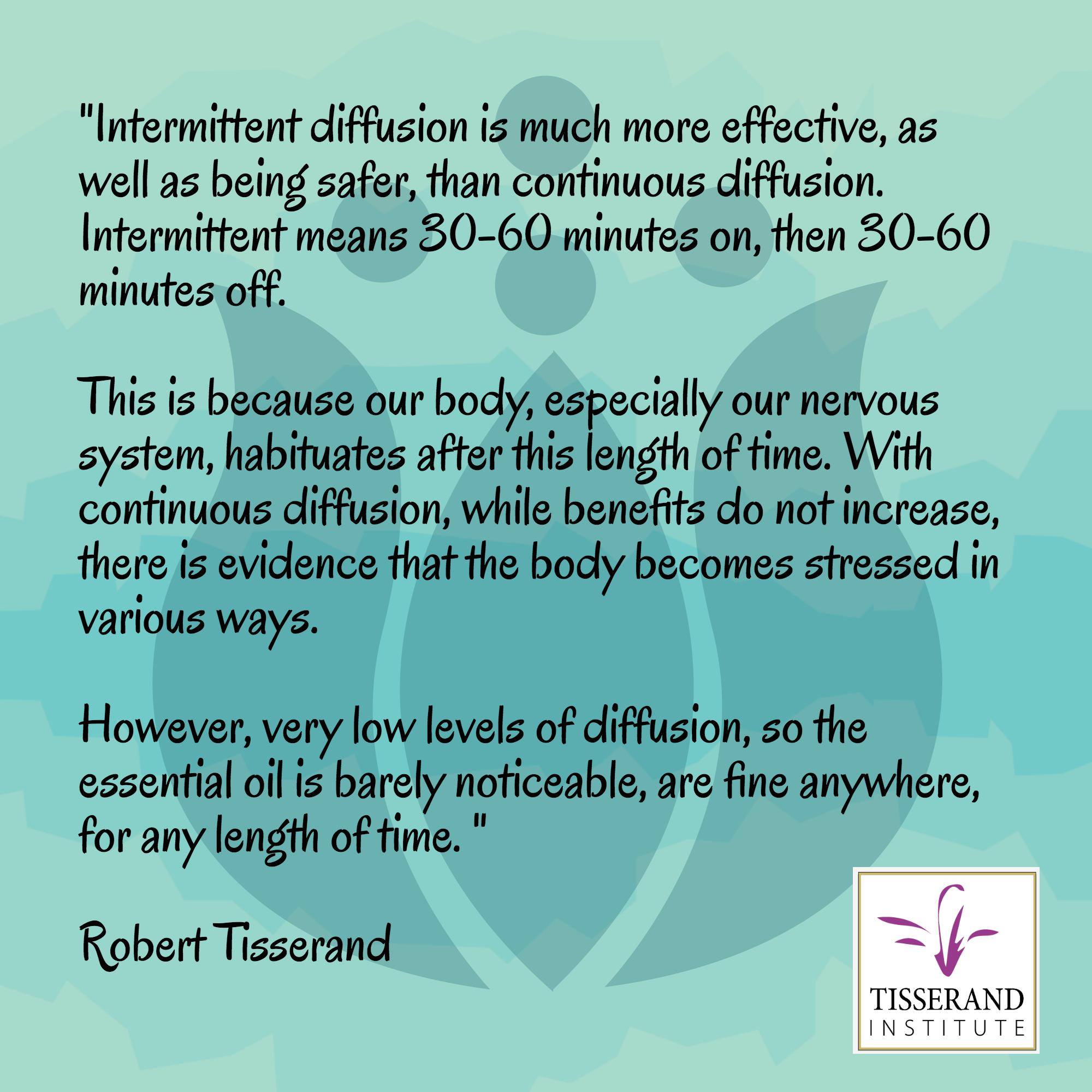Safety guidelines for diffusion:
“Intermittent diffusion is much more effective, as well as being safer, than continuous diffusion. Intermittent means 30-60 minutes on, then 30-60 minutes off.
This is because our body, especially our nervous system, habituates after this length of time. With continuous diffusion, while benefits do not increase, there is evidence that the body becomes stressed in various ways.
However, very low levels of diffusion – so the essential oil is barely noticeable – are fine anywhere, for any length of time.”
~ Robert Tisserand


Hello Robert!
Long time reader, huge fan of your work and public awareness efforts. I wanted to ask if it was possible for you to share the literature you mentioned about the body being stressed by over exposure to diffusion.
You can share this infographic anywhere you want to. 🙂 ~Hana, page admin
Sir, Could you please elaborate it how does body gets stressed on using continuous use of Eo.
Kaushik, You may find our Essential Oil Safety Masterclass very intriguing, as we cover this and much more related to the safe use of essential oils. 🙂 ~Shane (shane@tisserandinstitute.org)
https://tisserandinstitute.org/essential-oil-safety-master-class/
Hello, I just discovered your page and I’m very excited to read everything and learn. I do have a quick question. I have seen lots of people saying don’t diffuse constantly but if I only use 1-2 drops would that be ok for diffusing longer? Or does it not matter the amount? I’m just wondering if there is an Amount to Time ratio? I’m forgetful and it would be nice not to have to worry about remembering to turn my diffuser off, I’d like to just diffuse less oil and let it run but I can’t find anywhere that this is acceptable. I have seen the 12-hour diffusers can those be left on for the 12 hours or do those also need to be turned off after 30-60 min? Any suggestions would be very much appreciated. Also if you diffuse in a closed bedroom how long would it take for the oil to dissipate after you turn it off? Do you just go by your nose, smell? Is there a size-time chart anywhere? Thank you again.
Intermittent diffusion is best and actually more beneficial. That being said, if you are diffusing very low levels of essential oils simply for fragrance, it would be fine to have it run more frequently. ~Shane
Hello:)) – I was told that even if you cannot smell the oil aroma coming from the diffuser, that oil is still doing its job. Can you please explain what that means? Thank you!
Hi Marianna, When we diffuse, we can become ‘nose blind’ to the essential oil fragrance in the room pretty quickly. This simply means that we become used to the aroma, similar to the way we become used to many other smells in our home. Intermittent diffusion can help with this. You may also need to adjust the amount of oil you are using in your space, depending upon room size, diffuser size, air flow and other factors, though generally this is mostly related to simply becoming nose blind to an aroma thats been running for awhile. 🙂 ~Shane (shane@tisserandinstitute.org)
Can wintergreen oil be diffused? I was sure I had read somewhere that it shouldn’t but now cannot remember the source to clarify.
Hi Linda, Wintergreen oil does have several cautions, most specifically for internal and topical use, but should be used cautiously through inhalation as well. Wintergreen poses a high risk for toxicity, it can interact with certain drugs, inhibit blood clotting and higher doses can be teratogenic. It is certainly an oil to use with caution and one should have a good understanding of the essential oil, its constituents and how they affect the body. It could be safely diffused in appropriate amounts. ~Shane Carper
Taking an aromatherapy class and she gave us this website, interested in learning more.
Hi Karen,
Welcome! What questions do you have? We’re happy to help, and you can also send us an email to support@tisserandinstitute.org